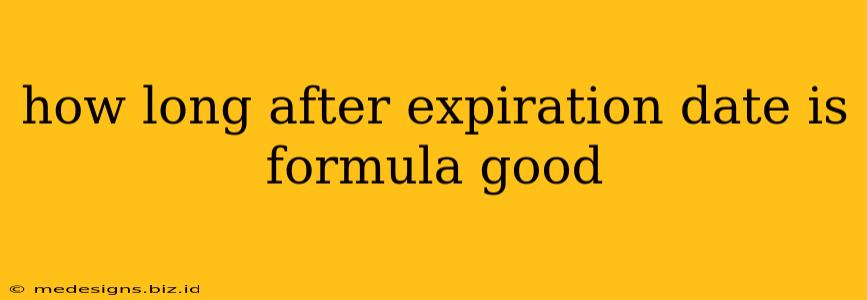Using expired baby formula is a risky gamble you shouldn't take. While many parents wonder if it's safe to use formula past its expiration date, the simple answer is no. This article will delve into why using expired formula is dangerous and what you should do if you find yourself in a situation where you're running low on formula.
Understanding Formula Expiration Dates
The expiration date on your baby's formula is not arbitrary. It represents the point at which the manufacturer guarantees the product's quality, potency, and safety. After this date, several factors can compromise the formula's nutritional value and potentially introduce harmful bacteria:
- Nutrient Degradation: Essential vitamins and minerals may degrade over time, reducing the nutritional value of the formula and potentially leading to nutritional deficiencies in your baby.
- Bacterial Contamination: Once opened, formula can become a breeding ground for harmful bacteria. Even if the container is sealed properly, the passage of time increases the risk of contamination. This risk significantly increases after the expiration date.
- Changes in Taste and Texture: Expired formula might develop an off-putting taste or texture, making your baby less likely to drink it. This can lead to nutritional problems.
How to Properly Store Formula:
Proper storage plays a vital role in maintaining formula quality. Here's what you should do:
- Store unopened cans: Keep unopened cans of formula in a cool, dry place. Avoid extreme temperatures.
- Store prepared formula: Refrigerate prepared formula within two hours of mixing. Use within 24 hours. Never reuse leftover formula.
- Check the expiration date: Always check the expiration date before using the formula. Dispose of any expired formula immediately.
What to Do if You Run Out of Formula
Running out of formula is a stressful situation, but there are steps you can take:
- Contact your pediatrician: They can provide guidance on temporary solutions and may be able to provide samples or connect you with resources.
- Reach out to family and friends: See if anyone can help by providing formula or lending you some money to buy more.
- Check local food banks or community organizations: Many communities offer assistance programs that can provide formula to families in need.
- Use formula from a reliable source: If you need to purchase formula quickly, ensure you're buying from a reputable source to avoid counterfeit products.
Never Use Expired Formula:
The risks associated with using expired baby formula outweigh any potential convenience. The potential for nutritional deficiencies, bacterial contamination, and health issues makes it simply not worth the risk. Prioritize your baby's health and safety by always using fresh, unexpired formula.
FAQs:
Q: Can I use formula that's a few days past its expiration date?
A: No, it's not recommended. The expiration date is there for a reason, and using expired formula poses unnecessary risks.
Q: What are the signs of spoiled formula?
A: Spoiled formula may have a different smell, taste, or texture than usual. It might also be clumpy or have visible mold. Discard any formula that shows any signs of spoilage.
Q: My baby drank some slightly expired formula. Should I be concerned?
A: Monitor your baby closely for any unusual symptoms such as vomiting, diarrhea, or fever. Contact your pediatrician immediately if you have any concerns.
By understanding the risks and following these guidelines, you can ensure your baby receives the safe and nutritious formula they need to thrive. Remember, prevention is key! Always keep a sufficient supply of formula on hand and plan accordingly to avoid running out.
